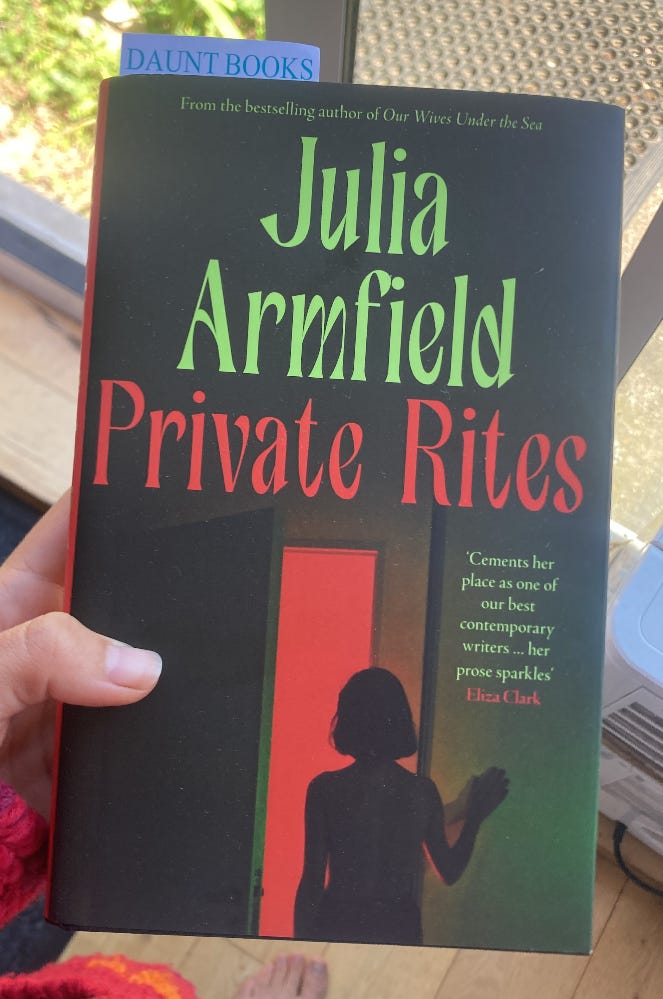I’ve had quite the cultural feast this week, so on this rainy Friday I thought I would share two morsels of note with you.

These kinds of things make it impossible to even consider moving away from London, and they always leave me feeling grateful to have so many minds and mediums at my fingertips.
On Wednesday, I met my friend Margaux and her friend Cam (who is fast becoming my friend too) at Daunt Books in Hampstead. Such a gorgeous little corner of the world and the plane trees on the path into the heath looked so majestic and smelt the way they always smell — deliciously green and vegetal.
The shop was hosting a conversation between Kaliane Bradley (author of The Ministry of Time) and Julia Armfield who has just released her second novel Private Rites, which was the focus of the interview. I had never heard of Julia before but was pretty much entranced by the way she spoke so eloquently and intelligently about the worlds she builds in her books — speculative worlds, worlds that centre queer characters without making their queerness the root of their suffering, very rainy worlds in a very wet future.
Private Rites is based in a water-logged Britain about 60 years from now, where the rain never stops, the cities are flooded, and everyone has had to move to greater and greater heights. Life sucks but they all get on with it, paying rent, going to work, sprinkling salt over flavourless GM tomatoes.
It follows three sisters — Isla, Irene, and Agnes — whose mean-sounding father has just died, and whose sororal dynamic quite closely matches my own in terms of age gaps: the two oldest are closer together, while the youngest is their half-sister and many years younger. There are a few smudges of personality that I also recognise but I’m very glad to say that me and my sisters get along a lot better than the characters do.
It sounds a bit depressing, and in many ways it is, but one thing that comes through very artfully in the prose is the nuance of human experience. Julia spoke about this when asked how she so realistically renders the lives of her characters, saying that the thing that makes a story feel real is when it captures the humour in situations that can at first glance seem dire. It’s the constant mix of the good and bad in life that makes a story convincing, and right now, I am fully submerged in Armfield’s reality of sisterhood, grief, and Dyke Night at the Compendium in a world several meters underwater.
This idea of nuance came through just as powerfully — if not more? — in this next cultural serving: a play called English that I saw last night at the Kiln Theatre in Kilburn.
It’s about an adult English class in Iran, where the four students are each learning the language for different reasons — Roya wants to move to Canada to live with her son, Elham has gotten into medical school in Melbourne but has attempted the English test 5 times already and just can’t seem to pass, Omid actually speaks pretty good English already and no one really knows why he’s there, and Goli is 18 with her whole life ahead of her.
Their teacher Marjan loves English — to the point of pulling up her own roots. She lived in Manchester for 9 years and yearns for the days when people in England would ask her for directions, thinking she was local. But more and more she’s slipping up, mispronouncing, losing her grip on this language that for many years she lost herself in.
Throughout the play, the characters clash and bond with each other and the language, grappling with the gap between the flawless command they have of their native Farsi, and sounding like babies learning their first words when they speak in English. It’s hilarious at some points and deeply sad at others, capturing how learning a language is never just about learning the words. In the case of these characters, it’s also about identity and acceptance, erasure and re-discovery.
Reflecting on it afterwards, it reminded me of a passage from an essay by David Sedaris that I read this week called Bruised: “It was so humbling, being robbed of my personality like that. I was never the smartest guy in the room, but I could usually hold my own. In Normandy, though, I was considered an idiot.”
At a time when so many people are leaving their homes, trying to learn new languages and fit into new countries far from their own, it’s worth remembering that behind a lightly held command of a second language can be found fully formed and rich personalities — adventurousness, optimism, kindness, to use Marjan's words.
This play so beautifully shows what is lost when the poetry of your own language is left behind to fit into the box of another, and if you can get tickets to see it, please do. It was incredible and I cried at the end.
OK, that’s all — have a good weekend and I’ll see you in the next one.
Annabel







Sororal! Such a good word! And good recs (v looking forward to reading Private Rites)